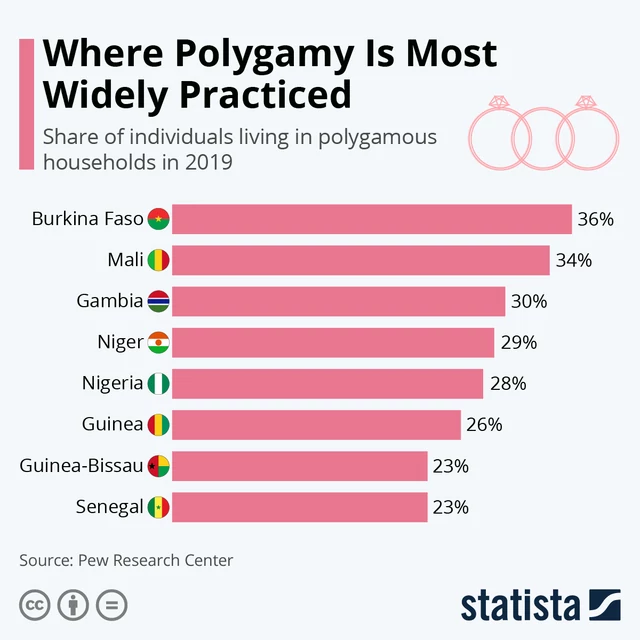Marriage is a social institution that varies greatly across different cultures, with polygamy being a prevalent practice in many African countries. Polygamy, the practice of having multiple spouses simultaneously, has a long-standing history in Africa and is deeply rooted in cultural traditions and beliefs. In this article, we will explore 18 African countries known for their high prevalence of polygamous marriages, shedding light on the cultural, historical, social, and legal factors that contribute to this unique aspect of African society.

1. Nigeria
Nigeria, the most populous country in Africa, is known for its diverse cultural practices, including polygamous marriages. Polygamy is legal and widely accepted among various ethnic groups in Nigeria, such as the Hausa, Yoruba, and Igbo. The practice often serves as a symbol of wealth, status, and fertility. In many Nigerian communities, a man’s ability to support multiple wives is seen as a sign of success and social standing. However, it is worth noting that urbanization and modernization have led to a decline in the prevalence of polygamy in some urban areas. Despite this, polygamy remains a significant aspect of Nigerian culture.
2. Kenya
Polygamy is also prevalent in Kenya, particularly among the Maasai, Samburu, and Turkana communities. In these cultures, a man’s ability to marry multiple wives signifies his economic prosperity and social standing. However, in recent years, there has been a growing trend towards monogamy due to factors such as urbanization, education, and changing societal norms. The government of Kenya recognizes both monogamous and polygamous marriages under the Marriage Act. Polygamy is deeply ingrained in Kenyan culture, and while the practice is evolving, it continues to be a part of many communities.
3. South Africa
While polygamy is not as widespread in South Africa as in some other African countries, it is practiced among certain ethnic groups, such as the Zulu and Swazi. Polygamous marriages are often seen as a way to strengthen family ties and ensure the continuation of lineage. In South Africa, polygamy is legal, but a man must obtain the consent of his existing wife or wives and must prove that he has the means to support additional wives and children. Polygamy plays a significant role in maintaining cultural traditions and family structures in South African communities.
4. Tanzania
In Tanzania, polygamy is commonly practiced, particularly among the Sukuma and Nyakyusa ethnic groups. Cultural traditions and religious beliefs play a significant role in the acceptance and prevalence of polygamous unions. Tanzania’s legal system recognizes both monogamous and polygamous marriages, and polygamy is protected under the Law of Marriage Act. Polygamy in Tanzania is often seen as a way to maintain family unity, social support, and economic stability.
5. Uganda
Polygamy is legal and widely practiced in Uganda, especially among the Baganda, Iteso, and Karimojong tribes. Economic considerations, desire for large families, and cultural traditions contribute to the acceptance of polygamous marriages in Ugandan society. The Ugandan constitution recognizes both monogamous and polygamous marriages, providing legal protection and rights to all spouses involved. Polygamy is deeply embedded in Ugandan culture and continues to be an important part of family structures.
6. Senegal
Polygamy is deeply ingrained in Senegalese culture and is practiced by various ethnic groups, including the Wolof, Serer, and Toucouleur. Senegal’s legal system recognizes polygamous marriages, and it is widely accepted as a means of preserving family ties and social status. However, some women’s rights organizations in Senegal have raised concerns about the potential for gender inequality and the economic challenges faced by women in polygamous marriages. Despite these concerns, polygamy remains a significant cultural practice in Senegal.
7. Mali
In Mali, polygamy is not only a cultural practice but also protected by law. It is prevalent among ethnic groups like the Bambara, Songhai, and Fulani. Polygamy often serves as a means to strengthen alliances between families and promote communal harmony. Despite legal recognition, there have been debates within Malian society about the potential negative effects of polygamy on women’s rights and gender equality. Polygamy continues to be a part of Malian culture, but discussions and debates surrounding its implications persist.
8. Ghana
Polygamy is permitted and widely practiced in Ghana, particularly among the Akan, Dagomba, and Ewe ethnic groups. Economic considerations, desire for children, and cultural traditions contribute to the prevalence of polygamous marriages in Ghanaian society. However, Ghanaian law requires that a man must obtain a court’s permission to enter into a polygamous marriage, and the court must be satisfied that the man has the means to support multiple wives andtheir children adequately. Polygamy remains a significant cultural practice in Ghana, although there is a growing trend towards monogamy in urban areas.
9. Ethiopia
Polygamy is legal and practiced in Ethiopia, especially among certain ethnic groups, such as the Oromo, Amhara, and Tigray. Cultural and religious factors, as well as economic considerations, contribute to the acceptance of polygamous marriages in Ethiopian society. However, the practice is more common in rural areas compared to urban centers. While polygamy is recognized and protected under Ethiopian law, there have been ongoing discussions and debates about its impact on gender equality and women’s rights.
10. Cameroon
Polygamy is widely practiced in Cameroon, particularly among ethnic groups like the Bamileke, Fulani, and Hausa. In Cameroonian culture, polygamy is seen as a way to preserve family lineage, strengthen social ties, and ensure economic stability. The legal system in Cameroon recognizes polygamous marriages, and it is protected under the civil code. However, there have been discussions about the need for legal reforms to address issues of gender equality and women’s rights within polygamous unions.
11. Democratic Republic of Congo
Polygamy is prevalent in the Democratic Republic of Congo, especially among ethnic groups like the Luba, Kongo, and Mongo. Cultural traditions, economic factors, and social norms contribute to the acceptance and practice of polygamy in Congolese society. Polygamous marriages are legal and recognized under Congolese law, and they often serve as a means to solidify social bonds and ensure the continuation of family lineage. However, there have been ongoing debates about the potential negative impacts on women’s rights and gender equality.
12. Niger
Niger has one of the highest rates of polygamy in the world. Polygamous marriages are deeply rooted in Nigerien culture and are practiced by various ethnic groups, including the Hausa, Fulani, and Tuareg. Economic considerations, desire for large families, and cultural traditions contribute to the prevalence of polygamy in Niger. The legal system in Niger recognizes both monogamous and polygamous marriages, and polygamy is protected under the country’s civil code. However, there have been discussions and debates about the potential implications of polygamy on women’s rights and gender equality.
13. Burkina Faso
Polygamy is widely practiced in Burkina Faso, particularly among ethnic groups like the Mossi, Fulani, and Bobo. Polygamous marriages are legal and recognized under Burkinabe law, and they play a significant role in social and cultural practices. Economic considerations, desire for children, and cultural traditions contribute to the acceptance of polygamy in Burkinabe society. However, discussions about women’s rights and gender equality have prompted some activists to call for reforms within the legal framework surrounding polygamous unions.
14. Ivory Coast
Polygamy is practiced in Ivory Coast, especially among ethnic groups like the Baoulé, Senufo, and Malinke. Polygamous marriages are recognized and protected under Ivorian law, and they often serve as a means to solidify family ties and ensure social stability. Cultural traditions, economic factors, and social norms contribute to the prevalence of polygamy in Ivorian society. However, there have been ongoing discussions and debates about the potential impact on women’s rights and gender equality within polygamous unions.
15. Benin
Polygamy is a prevalent practice in Benin, particularly among ethnic groups like the Fon, Yoruba, and Bariba. Cultural traditions, economic considerations, and social norms contribute to the acceptance and practice of polygamous marriages in Beninese society. Polygamy is legal and recognized under Beninese law, and it often serves as a means to strengthen family ties and ensure economic stability. However, discussions about women’s rights and gender equality have prompted debates about the need for legal reforms within polygamous unions.
16. Chad
Polygamy is legal and practiced in Chad, primarily among Muslim communities. The practice is generally accepted and seen as a way to ensure social and economic stability within families. The Chad Civil Code recognizes polygamous marriages, and it outlines the rights and responsibilities of spouses in such unions.
17. Somalia
Polygamy is prevalent in Somalia, where cultural and religious traditions strongly influence marital practices. Multiple wives are often seen as a symbol of a man’s wealth and social status. While the Somali Civil Code does not explicitly address polygamy, customary and Islamic laws play a significant role in regulating polygamous marriages in the country.
18. Sudan
Polygamy is widely practiced in Sudan, particularly among Muslim communities. Sudanese law allows men to have up to four wives, and polygamy is seen as a way to secure family ties, provide for widows, and maintain social cohesion. The Personal Status Act of 1991 in Sudan addresses polygamy and outlines the conditions and rights associated with polygamous marriages.

Polygamy remains a significant aspect of African culture, with many African countries embracing and recognizing the practice. While polygamy continues to face discussions and debates about its implications for gender equality and women’s rights, it remains deeply rooted in cultural traditions, social norms, and economic considerations. Understanding the prevalence of polygamous marriages in these African countries sheds light on the diverse cultural landscape of the continent, emphasizing the importance of recognizing and respecting cultural diversity when examining societal practices and institutions.

